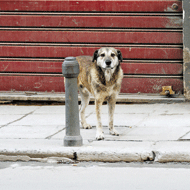
Scientists conclude vaccine could be used as temporary measure
A rabies vaccine that is usually given to dogs may also protect cattle from the disease, according to new research.
Rabies is endemic in almost all regions of China. In north-west China, the disease is transmitted by stray dogs and wild foxes and has caused heavy economic losses to local herdsmen.
The disease is not currently controlled in the country because there is no oral vaccine for wild dogs or foxes, nor is there a vaccine for large domestic animals.
Writing in the journal PLOS Neglected Tropical Diseases, Chinese scientists report that a vaccine developed to protect pet dogs could offer long-term protection to domestic camels and cattle.
"To control rabies in domestic animals, only one type of vaccine, i.e. canine inactivated vaccine, can be used to immunise via the intramuscular injection route," the researchers explain.
"To be accepted by local veterinarians and farmers, the vaccine must be low-cost and easy to use. In the study, a singe vaccination of two doses of canine vaccine has been shown to induce levels of virus neutralizing antibodies indicative of protection against rabies in cattle and camels."
China has seen three large epidemic waves of rabies since 1949. During the last wave (1996-present), the reported number of people dying from rabies has decreased, reflecting improvements in public awareness and the availability of post-exposure treatment.
But despite this good news, the rabies epidemic is still geographically expanding and new cases have been recorded in previously rabies-free regions, namely Gansu, Tibet and Qinghai.
In north-west China, rabies transmitted by wild foxes and stray dogs has caused heavy economic loss to local herdsmen following infection of camels, cattle, goats and horses. But in China, as well as lacking an oral vaccine for control of the disease, no veterinary vaccine for rabies has been developed nor imported for domestic animals except owned dogs.
The authors conclude that while local dog vaccines can be used as a temporary measure to protect camels and cattle from the disease, more research must be devoted to developing oral vaccines for dogs and wild foxes.



 The veterinary mental health charity Vetlife is inviting the veterinary community to join it for a sponsored cold-water dip.
The veterinary mental health charity Vetlife is inviting the veterinary community to join it for a sponsored cold-water dip.